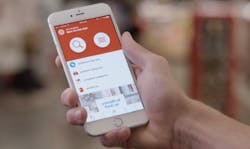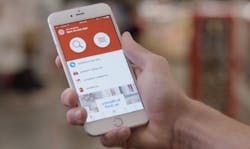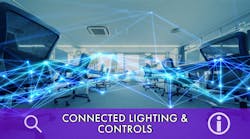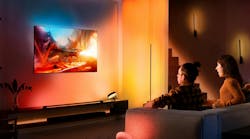If Target is using only Bluetooth for its indoor positioning system, why does its privacy policy indicate it is also tapping ‘LED light chip technologies’? Hmmm...
US retail giant Target gave a huge boost to Internet of Things (IoT) lighting recently when it decided to install lighting-based indoor navigation systems in nearly 1000 stores by Christmas. But in so doing, it has created a bit of a mystery about the technology that it has chosen.
As LEDs Magazine reported earlier this month, Target will tap LED ceiling lights from Acuity Brands to send signals to shoppers' phones. A Target app will then turn those signals into maps that help guide people around the aisles to specific items, and to provide information about products and discounts.
The question is, how is Target emitting the signals that emerge from the lighting fixtures?
Many lighting, communications, and IT engineers are interested in the answer because a general technology battle is emerging between various radio technologies. The RF techniques are also vying against a lighting-specific method called visible light communication (VLC), which uses LED lightwaves — rather than radio frequencies — to carry data. To add to the drama, indoor positioning systems don't even have to reside in the lights, although lighting firms are pushing to put them there.
Target said this mobile app receives indoor mapping signals from Bluetooth beacons embedded in the lights. But the retailer does not seem to have ruled out the eventual use of VLC as well. (Photo credit: Target.)
When LEDs Magazine reported the story earlier this month, Target told us that it is delivering information from Bluetooth radio beacons embedded in ceiling luminaires, and that it is not using VLC.
“Lights include BLE [Bluetooth transmitter] technology that enables the new 'blue dot' GPS-like technology available in about half our stores through the iPhone version of the Target app,” a Target spokesperson said at the time. “We are not using VLC.”
That answer was curious enough, because Target had been trialing both Bluetooth and VLC for more than two years, and VLC had been expected to become part of the mix. Vendor Acuity can embed either or both into its luminaires, as part of its broad Atrius smart lighting initiative. Target declined to elaborate on its decision to go with Bluetooth.
Things got even more curious when our astute colleagues at Lux uncovered a clause in Target's customer privacy policy basically stating that Target is using VLC as well as Bluetooth. Under the “mobile location information” section of the policy, Target notes: “In-store location through the use of your phone’s blue tooth signal, LED light chip technologies or other technologies will permit Target to find nearby products for you, get you real-time deals, auto-sort your shopping list and more.”
The phrase “LED light chip technologies” strongly suggests VLC is in play. VLC works by modulating the lightwaves emitted by the LED chips that serve as the source of light in an LED luminaire. A phone's camera sensor detects the modulations.
So we went back to Target, and asked again whether it is using VLC.
“We are not,” the spokesperson reiterated. He offered no other information, so we asked why the privacy policy essentially states otherwise.
“This does not involve VLC technology,” he repeated. “If you want rationale or an explainer on how privacy policies are written, that’s a question for people expert in that field. They can help you with additional conjecture.”
We asked to speak with the app policy writers, to no avail.
Our best “conjecture” is that Target might well add VLC to its IPS lights in the future, while going with only Bluetooth for now. By including VLC — or, as Target calls it, “LED light chip technologies” — in the privacy policy, the policy writers could be covering a VLC eventuality.
Or it's possible that the ink dried on the privacy policy before Target decided against VLC, although that is a less likely scenario. As long as we're throwing in speculation: Perhaps there's more than one mapping system at Target, with the Target app using Bluetooth, and VLC driving something else.
Bluetooth and VLC each have their advantages and disadvantages, as evidenced by separate examples of both in Europe. Bluetooth is not as accurate as VLC. Thus Bluetooth-based systems cannot guide shoppers as close to their discounted Batman figurine, snazzy new sweater, or cheap tube of toothpaste as VLC can. On the downside for VLC: It requires the individual to constantly point the phone toward the lights, while Bluetooth chips do not require line of sight; the VLC technology also requires the lights to be switched on, which could be a problem in a setting with ample daylight; and it is also believed to be more of a phone battery drain than Bluetooth.
There might also be legal issues surrounding the use of VLC intellectual property rights.
We asked Acuity if they could help clarify things. They said they could not comment specifically about the Target deployment. Point Inside, which was involved in earlier IPS trials at Target and is partnered with Acuity, did not respond to several emails. The Target spokesperson said Point Inside is no longer involved, and that Target's internal team developed the mapping that works with the Target app. It was not developed by Acuity's new mapping partner LocusLabs, he said.
But speaking in general about Bluetooth versus VLC and other technologies, Acuity vice president and general manager of IoT Greg Carter noted, “We are seeing some of our customers start by using just one beacon in their applications to simplify the process. but we fully anticipate that over time as they expand the use of the Atrius services to solve multiple use cases, they will end up using both technologies based on each one’s unique benefits.”
LEDs recognizes that Target might eventually switch on the VLC, especially as Acuity adds new features. Acuity’s partner LocusLabs is working on some dazzling new renditions of VLC mapping software, we hear.
To take Target at its word, it's a Bluetooth show for the moment.
Sherlock Holmes once solved a murder mystery by noting “the curious incident of the dog in the nighttime” (yes, the eponymous modern stage play takes its name from the quote). The legendary detective observed that a dog had curiously remained silent during a break-in. The canine therefore must have known the perpetrator, who was thus not the stranger whom others suspected. With that, Holmes cracked the case, known as Silver Blaze.
We are not Holmes-caliber gumshoes. But in observing the IoT lighting at Target, we feel a bit like Conan Doyle's hero in noting the curiosity of silence. The silence of the VLC. Unlike in Silver Blaze, though, this story might still be open, as Target could eventually turn to VLC to complement the Bluetooth.
Wherever VLC stands in the mix, the bigger picture remains clear: Target has helped advance the case for IoT lighting.
MARK HALPERis a contributing editor for LEDs Magazine, and an energy, technology, and business journalist ([email protected]).






